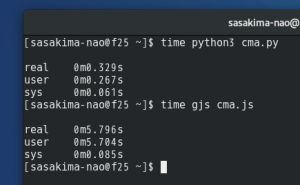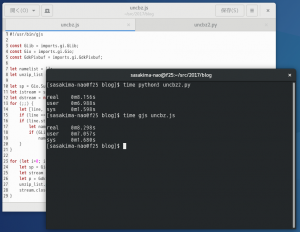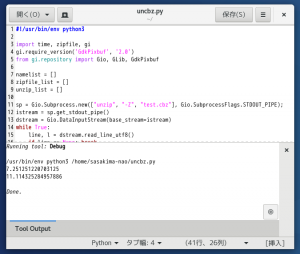おまたせ、Comipoli Gjs 版が遅くて出せない原因が判明しました。
#!/usr/bin/env python3
import gi
gi.require_version('Clutter', '1.0')
gi.require_version('GdkPixbuf', '2.0')
from gi.repository import Clutter, Cogl, GdkPixbuf
Clutter.init()
PICTURE = "burgman400.jpg"
pixbuf = GdkPixbuf.Pixbuf.new_from_file(PICTURE)
image = Clutter.Image()
image.set_data(
pixbuf.get_pixels(),
Cogl.PixelFormat.RGB_888,
pixbuf.get_width(),
pixbuf.get_height(),
pixbuf.get_rowstride()
)
と
#!/usr/bin/gjs
const Clutter = imports.gi.Clutter;
const Cogl = imports.gi.Cogl;
const GdkPixbuf = imports.gi.GdkPixbuf;
Clutter.init(null);
const PICTURE = "burgman400.jpg";
let pixbuf = GdkPixbuf.Pixbuf.new_from_file(PICTURE);
let image = new Clutter.Image();
image.set_data(
pixbuf.get_pixels(),
Cogl.PixelFormat.RGB_888,
pixbuf.get_width(),
pixbuf.get_height(),
pixbuf.get_rowstride()
);
で
何ですかこの圧倒的なスピード差は!!!
というより Gjs のこの異様な遅さは何なんだ?
GdkPixbuf を使うだけなら特に差が無いのに。
憶測だけど PyGObject は get_pixels でバイナリ出力を直接使っていると思う。
Gjs は多分バイナリ出力を Uint8Array オブジェクトに変換している。
言語仕様の制限だろうからセット関数の追加が無いかぎりこのままだろうね。
ClutterImage に画像セットはコレしか手段が無い、これは困った。
Gjs でいくなら ClutterCnavas で cairo という手しか無いっぽい。
でもそれなら GtkDrawinArea でいいじゃん、ということになり…
結論、Clutter で画像を使うのに Gjs は絶望的に向いていません。


